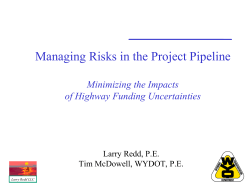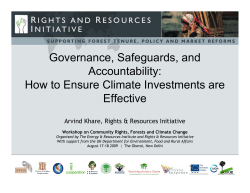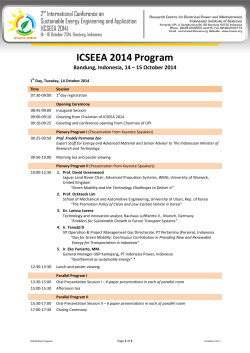
- geostech
Business as usual or transformational change: power and politics in national REDD+ Maria Brockhaus Jakarta, March 2015 CIFOR’s Global Comparative Study (GCS-REDD+) • To support REDD+ policy arenas and practitioner communities with - information - analysis - tools • so as to ensure 3E+ outcomes: - effectiveness - efficiency - equity and co-benefits THINKING beyond the canopy Analysis of national REDD+ policies and processes in 14 countries since 2009 http://www.forestsclimatechange.org/global-comparativestudy-on-redd.html REDD+ = Transformational change versus business-as-usual Transformational change: ‘a shift in discourse, attitudes, power relations, and deliberate policy and protest action that leads policy formulation and implementation away from business as usual policy approaches that directly or indirectly support deforestation and forest degradation’ (Brockhaus and Angelsen, 2012; Di Gregorio et al, 2012 in ‘Analysing REDD+’) THINKING beyond the canopy Examples of transformational change In the context of REDD+, transformational outcomes can be i) changes in economic, regulatory and governance frameworks, including the devolution of rights to local users; ii) removals of perverse incentives, such as subsidies and concessions that serve selective economic interests and stimulate deforestation and forest degradation; and iii) reforms of forest industry policies and regulations that effectively reduce unsustainable extraction THINKING beyond the canopy Seeing REDD+ through 4I’s: institutions, interests, ideas, information (Brockhaus and Angelsen 2012) How do the 4 Is hinder or enable change (1) • Institutional stickiness: Formal power typically rests with the ‘stickiest’ organisations – those with enough influence to resist change – while new institutions and actors are ignored or remain isolated (e.g. colonial rules, Ministries responsible for natural resources) • Interests: State’s interest in social and economic welfare can fall short if lack of autonomy from interests that drive deforestation and degradation (e.g. rent seeking, fraud, collusion and corruption practices inside the bureaucratic system) THINKING beyond the canopy How do the 4 Is hinder or enable change (2) • Ideas: discourse affects policy making, they frame the problem and present a limited set of choices of what is ‘reasonable’ or what is put forward as ‘the possible’ (e.g. REDD+ benefits for those who contribute to efficiency and effectiveness, versus benefits for those who have moral rights based on equity considerations) • Information: Facts, rather than speaking for themselves, are selected, interpreted, and put in context in ways that reflect the interests of the information provider (e.g. reference level setting) THINKING beyond the canopy Approach: investigating politicoeconomic constraints to effective, efficient and equitable REDD+ policies (Brockhaus, M., and M. Di Gregorio. 2012. A brief overview: Component 1 on national REDD+ policies and processes. CIFOR) Institutional Context and Path-Dependencies (country context studies) (Brockhaus, M., M. Di Gregorio and S. Wertz-Kanounnikoff. 2012. Guide for country profiles: Global Comparative Study on REDD (GCS-REDD). Component 1 on National REDD+ Policies and Processes. CIFOR) Ideology, Policy Discourses and Coalitions for Change (media and actor stance analysis) (Di Gregorio, M., Price, S., Saunders, C. and Brockhaus, M. 2012. Code book for the analysis of media frames in articles on REDD. CIFOR) Policy Network Structures: Constraints and Opportunities for effective policy design (policy network analysis) (see special issue in Ecology & Society) Qualitative Comparative Analysis (QCA): Progress in national REDD+ policy design (Korhonen-Kurki et. al. 2014) THINKING beyond the canopy Key policy challenges and regime types (selected countries) Source: Di Gregorio, M., Brockhaus, M., Cronin, T., Muharrom, E. June 2012. Politics and power in national REDD+ policy processes. In Analysing REDD+: Challenges and choices, 69-90. CIFOR, Bogor, Indonesia. ) Country Drivers of deforestation and forest degradation Indonesia Agriculture (large scale incl. forest plantations as oil palm, small scale & subsistence), logging, mining Brazil Agriculture (large- and small-scale ranching, commodity crops) , infrastructure, selective logging, mining, Policies that clash whith Policies that support REDD+ REDD+ aims Pulp and paper; mining permits in protected areas; fiscal and nonfiscal concessions for food estate and energy estate development; biofuel development; land allocation for oil palm plantations Rural credit for cattle ranching / infrastructure development (roads and dams); land tenure rules favouring land grabbing fire Cameroon Agriculture (mediumand small-scale, subsistence); logging; mining Devaluations boosting logging exports; infrastructure (roads, rails and dams); mining and large-scale agriculture projects Moratorium on Granting of New Licenses and Improvement of Natural Primary Forest and Peatland Governance (although considered a ‘weak’ policy due to the influence of business on government) Forest Code conservation requirement on private land, improved enforcement of landuse policies (incl. protected areas), economic & ecological zoning, efforts to certify producer legality commercial chains (beef, soy), land regularization process, realtime monitoring of deforestation. Law No 2011/08 on Guidelines for Territorial Planning and Sustainable Development in Cameroon Democrac Lack of autonomy / y category possible capture by score special interests (index )* Medium-High (pressure from large scale plantations and logging, pulp and Flawed paper, mining and democracy electoral campaigns) (6.53) Medium-high (land speculation, illegal logging, cattle ranching, tax evasion, drug trafficking, patron-client relationships and electoral campaigns) Flawed democracy (7.12) Level of centraliz ation Decentral ised with tensions Federal system High in the logging sector (corruption driving illegal Authoritarian logging includes (3.41) national and local elite) *: source: The Economist 2011. Democracy Index 2011:democracy under stress. A report from the Economist Intelligence Unit. High indexes refer to democracies and low indexes to authoritarian regimes. Sources: May et al. 2011; Dkamela 2011; Indrarto et al. 2012; Pham et al. 2012; CEDLA and CIFOR 2013; Forest Action and THINKING beyond the canopy CIFOR 2013; DAR and CIFOR 2013) Decentral ised but with limits Actors shaping the discourse in three major daily print media Actor group Indonesia Brazil Cameroon Vietnam Bolivia Peru Nepal State (national) 45 26 8 67 50 12 17 State (sub-national) 7 2 0 0 3 0 6 Corporate 3 4 0 6 10 0 6 Intergovernmental 8 7 17 27 9 25 6 Research (international) 5 11 42 0 0 25 6 NGO+ENGO(international) 16 17 0 0 10 25 0 Research (national) 6 13 25 0 3 0 12 civil society actors (national) 10 20 8 0 15 13 47 TOTAL % of actors 100 100 100 100 100 100 100 TOTAL no. actors 219 113 12 32 60 8 17 THINKING beyond the canopy Power of Agency (Brockhaus et al 2014 Governing the design of REDD+) Who speaks business-as-usual, who speaks transformational change ? Frame analysis, Actor groups in the main BAU and TC discourse coalition (no. actor stances expressed in the coalition = frequency), No. of coalition actors How powerful are these voices ? Reputational power index 𝑅𝑅𝑝𝑝 = 𝑛𝑛𝑝𝑝 ∑𝑖𝑖=1 𝑖𝑖𝑖𝑖 𝑖𝑖 𝑛𝑛𝑝𝑝 𝑛𝑛−1 No. of coaltition group members * reputational power index, Reputational power index of discourse coalition 𝑅𝑅𝑑𝑑 = sum of (No. of coalition group members x reputational power index) THINKING beyond the canopy Power of which agency? State speaks BAU, often represents business interests, rights are framed around global equity issues CSO often call for transformational change, with focus on rights issues In most countries, BAU is much more powerful than TC No actors speak “root causes of deforestation” …. highly problematic for REDD+ .. !!! THINKING beyond the canopy Indonesia Fragmentation in Information exchange network Exchange of information very limited, actors of same types mainly speak together, no ‘real’ exchange WHY? •Organizations are not aware of each other? •Some are not seen as important? •Respect??? 4 distinct clusters Homophily strong in national government cluster Only one bridge Moeliono, M., C. Gallemore, L. Santoso, M. Brockhaus, and M. Di Gregorio. May 2014. Information networks and power: confronting the "wicked problem" of REDD+ in Indonesia. Ecology and Society 19(2): 9. REDD+ progressing? THINKING beyond the canopy Major events in REDD+ policy arenas Brockhaus, M., Di Gregorio, M., 2014. National REDD+ policy networks: From cooperation to conflict. Ecology & Society. Forthcoming. Some selected key findings: from rhetorics to policy change for REDD+? • Overall progress slow, countries stuck in REDD+ readiness, but progress visible need for more certainty about finance to provide credibility for shifts in incentives • (Brockhaus et al. 2014. REDD+ policy networks: Exploring actors and power structures in an emerging policy domain. Ecology & Society. Forthcoming.) • The promise of perfomance-based funding plays a positive role in achieving REDD+, when it is applied in countries that have a strong national ownership and lead the process themselves, rather than led donors lead it • (A second round of qualitative comparative analysis – Korhonen-Kurki et al, unpublished project document ) From cooperation to conflict (Brockhaus and Di Gregorio 2014) Honeymoon phase: Nepal, Tanzania and Cameroon: Countries in the early stages of national REDD+ policy debates, display dominance of cooperation Bargaining for change: Indonesia, Brazil, PNG: Power struggles intensify: bargaining (conflictual cooperation) becomes dominant when the national REDD+ policy process starts to address specific policies and measures, particularly on controversial issues such as benefit sharing 18 THINKING beyond the canopy Final thoughts… • BAU actor coalitions are powerful, main drivers of deforestation not yet tackled, but no REDD+ without needs state with ‘societal welfare rationale’ to counterbalance deforestation-driving ‘profit rationale’ (Obidzinski et al. 2014. Oil palm plantation investments in Indonesia’s forest frontiers: limited economic multipliers and uncertain benefits for local communities. Environment, Development and Sustainability, 1-20; Salvini, G., Herold, M., De Sy, V., Kissinger, G., Brockhaus, M., & Skutsch, M. (2014). How countries link REDD+ interventions to drivers in their readiness plans: implications for monitoring systems. Environmental Research Letters, 9(7), 074004.) Global comparative analysis of policies and processes Country Profiles Working Papers Media-based discourse analyses Journal Articles Info Briefs Acknowledgements This work is part of the policy component of CIFOR’s global comparative study on REDD (GCS). The methods and guidelines used in this research component were designed by Maria Brockhaus, Monica Di Gregorio and Sheila Wertz-Kanounnikoff. Parts of the methodology are adapted from the research protocol for media and network analysis designed by COMPON (‘Comparing Climate Change Policy Networks’). Case leaders: Thuy Thu Pham (Nepal), Thuy Thu Pham & Moira Moeliono (Vietnam), Thuy Thu Pham and Guillaume Lestrelin (Laos), Daju Resosudarmo & Moira Moeliono (Indonesia), Andrea Babon (PNG), Peter Cronkleton, Kaisa KorhonenKurki, Pablo Pacheco (Bolivia), Mary Menton (Peru), Sven Wunder & Peter May (Brazil), Samuel Assembe & Jolien Schure (Cameroon), Samuel Assembe (DRC), Salla Rantala (Tanzania), Sheila Wertz-Kanounnikoff (Mozambique), Suwadu SakhoJimbira & Houria Djoudi (Burkina Faso), Arild Angelsen (Norway). Special thanks to our national partners from REDES, CEDLA Libelula and DAR, REPOA, UEM, CODELT, ICEL, ForestAction, CIEM, CERDA, Son La FD, UPNG, NRI-PNG, and UMB. Thanks to contributors to case studies, analysis and review : Levania Santoso, Tim Cronin, Giorgio Indrarto, Prayekti Murharjanti, Josi Khatarina, Irvan Pulungan, Feby Ivalerina, Justitia Rahman, Muhar Nala Prana, Caleb Gallemore (Indonesia) Nguyen Thi Hien, Nguyen Huu Tho, Vu Thi Hien, Bui Thi Minh Nguyet, Nguyen Tuan Viet and Huynh Thu Ba (Vietnam), Dil Badhur, Rahul Karki, Bryan Bushley, Naya Paudel (Nepal), Daniel McIntyre, Gae Gowae, Nidatha Martin, Nalau Bingeding, Ronald Sofe, Abel Simon (PNG), Walter Arteaga, Bernado Peredo, Jesinka Pastor (Bolivia), Maria Fernanda Gebara, Brent Millikan, Bruno Calixto, Shaozeng Zhang (Brazil), Hugo Piu, Javier Perla, Daniela Freundt, Eduardo Burga Barrantes, Talía Postigo Takahashi (Peru), Guy Patrice Dkamela, Felicien Kengoum (Cameroon), Felicien Kabamba, Augustin Mpoyi, Angelique Mbelu (DRC), Demetrius Kweka, Therese Dokken, Rehema Tukai, George Jambiya, Riziki Shemdoe, (Tanzania), Almeida Sitoe, Alda Salomão (Mozambique), Mathurin Zida, Michael Balinga (Burkina Faso), Laila Borge (Norway). Special thanks to Efrian Muharrom, Sofi Mardiah, Christine Wairata, Ria Widjaja-Adhi, Cecilia Luttrell, Frances Seymour, Lou Verchot, Markku Kanninen, Elena Petkova, Arild Angelsen, Jan Boerner, Anne Larson, Martin Herold, Rachel Carmenta, Juniarta Tjajadi, Cynthia Maharani Thanks We acknowledge the support from: Norad and the Ministry of Climate Change and Environment of Norway, AusAID (Australia), European Commission, Dept. of Energy and Climate Change & Dept. for Int. Dev. (UK), USAID (US) & all research partners and individuals that have contributed to the GCS research
© Copyright 2025














